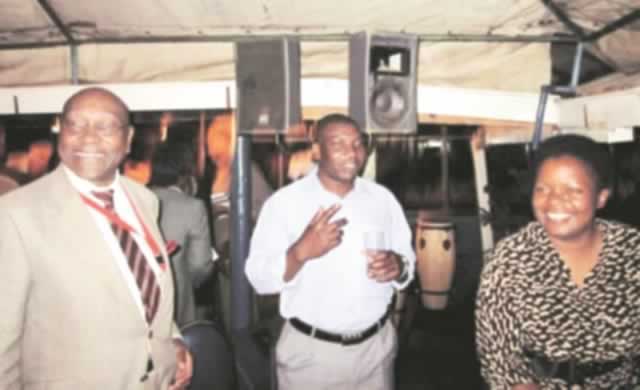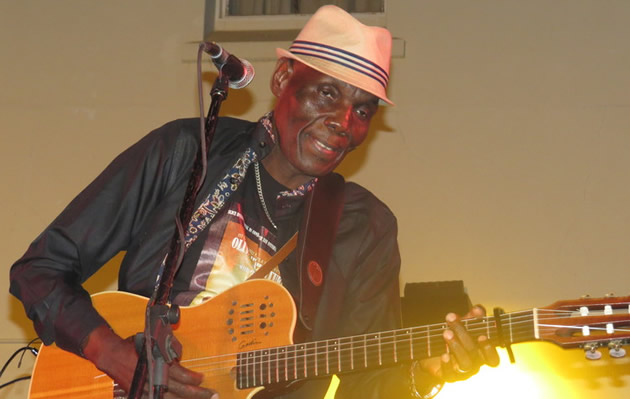Recovery pitch for Zimbabwean literature


Professor George Kahari (left) . . . has published 22 guides to Zimbabwean literature and has two forthcoming titles, “The Odyssey of Shona Narratives” and “A Standard Dictionary of Shona-English Names”, tentatively slated for release this year.
Stanely Mushava Literature Today
Thankfully, Kahari’s generous retrospect to Samkange, Solomon Mutswairo, Geoffrey Ndlala, Wilson Katiyo and others, along with snippets from their novels, others set a nostalgic tone equal to this call.
Book: The Search for Identity and Ufuru
Author: George Kahari
Publisher: Mambo Press (2009)
ISBN: 978 0 86922 818 0
A torrent of narratives has captured, with a flavour unique to each generation, the experience of being Zimbabwean.
Our creative industries have secured through the mystic codes of art, a place for each set period in this thread of the great Zimbabwean tradition.
We have been lately surfing back in time to retrieve the finest content from this tradition. Reception of yesteryear art, chiefly music, seems rebound.
Sadly, as other creative industries are provoking attached memories in this web-powered hindsight, Zimbabwe’s literary canon of six decades, is barely visible.
The trailblazing titles of the 1950s and 1960s are largely out of circulation. If not for rare copies on online shelves, there would be no trace of these important works.
Thanks to cultured men of letters like Professor George Kahari, the Zimbabwean tradition will not die.
Kahari has worked extensively to broker critical posterity for Zimbabwean writers.
He has published 22 guides to Zimbabwean literature and has two forthcoming titles, “The Odyssey of Shona Narratives” and “A Standard Dictionary of Shona-English Names”, tentatively slated for release this year.
We look at one of his more comprehensive guides, “The Search for Identity and Ufuru,” a celebration of the indigenous canon reaching over the formative decades of Zimbabwean literature from 1956 to 1980.
Kahari is, however, emphatic on the dating of Zimbabwean literature.
He makes recurrent reference to orature, a tradition antedating the written narrative and to which most latter-day genres owe their Zimbabwean flavour.
He tags T. J. Couzens’s “Early South African Black Writing” article to demonstrate the case.
The resourcefulness of early men of letters such as Ezekiel Mphahlele, Lewis Nkosi, Peter Abrahams and Can Themba south of the border, Couzens points out, “required a long prior history of the slow accumulation of literary capital and the application of much imaginative industry”.
Kahari is awake to a similar pattern in the Zimbabwean tradition, which probably explains why his research taskbar is lined up with Shona proverbs, riddles, social registers, poetry, traditional narrative genres, elegiacs, panegyrics and children’s songs.
These have an unquestionable stake in the development of the canon.
The 2009 revision of the original 1980 publication “The Search for Zimbabwean Identity: An Introduction to the Black Zimbabwean Fiction in English, 1956-1980,” incorporates reviews of eight more novels, one novella and 28 short stories.
The extension, explains Kahari, was facilitated by the need to accommodate the stream-of-the-consciousness mode, the evolution of short story genres and their link with orature.
“Ufuru” the addition to the 2009 title refers to overflowing like froth (furu/furo) from the limited confinement of a container, uninhibited like the stream in question.
Kahari’s book has a fascinating range of early writers.
To these are juxtaposed the writers (or is it characters?) of the second generation who sent the picture-perfect templates of their predecessors to the devil.
These were bent to the disruptive and the empirical but were never entirely detached from the jam-packed trove of pre-colonial orature.
Charles Mungoshi is a sterling case.
Mungoshi demonstrates better than his predecessors how both operational and astute certain strands of indigenous lore are, even with respect to the dislocated current setting.
The preceding school, in contrast, appropriated these chiefly as icons of a remote golden age.
Whatever the second generation brought to the Zimbabwean tradition, though, the founding feats can never be gainsaid.
I have seldom relished the experience of literature as I did on reading possibly one of the few surviving copies of Stanelake Samkange’s “The Mourned One”.
If anyone has shared the experience, then I may not be the only one who expects the Culture Ministry to step in and incentivise the recovery of our endangered cultural products.
Thankfully, Kahari’s generous retrospect to Samkange, Solomon Mutswairo, Geoffrey Ndlala, Wilson Katiyo and others, along with snippets from their novels, others set a nostalgic tone equal to this call.
Kahari classifies Zimbabwean fiction into four divisions, old world romances, new world novels, new world novella and new world short stories.
Katiyo’s “A Son of the Soil” and Ndlala’s “Jikinya” are potent implements in the art of nostalgia.
There are no thornless roses in the past much as the cosmic clash between good and evil has been ever present in every setting.
The Zimbabwean identity is not set in stone, as the processes of debasement and abasement are ever in force.
However, there is a lot to redeem. The early authors demonstrate as much.
Bar the colonialist residue, an initiative of Literature Bureau proportions should be able to facilitate for Zimbabwe a significant, sustained and globally competent culture industry building on this deserted foundation.
Perhaps, the high point of this “Search for Identity” is a juxtapositions of Zimbabwean literature’s two towering icons, Mungoshi and Dambudzo Marechera, though Kahari does not handle their work by way of deliberate contrast.
Mungoshi, perhaps the foremost fiddler of family values, comes across as the cultural thoroughbred, fine-tuning his art to champion, in a more durable and riveting tenor, what his predecessors propagated through abstractions.
Marechera, often tagged the enfant terrible of local literature, is averse to the notion of morality itself.
A literary encyclopedia of the dystopian sort, Marechera refuses a cultural advocacy role, revelling rather in an egocentric artistic universe where purposelessness is the purpose.
He dismantles every ideological mainstay deemed obstructive to his blind individual impulse.
There are no roses in his dystopia. Neither virtue nor fraternity. No heroes but explorers of individual gratification in a perpetual moral blackout.
He refuses to be institutionalised and, as Eliot puts it in “Little Gidding”, refuses to ring the bell backward, to revive old factions, to restore old policies or to play an antique drum.
For Mungoshi, the mainstays must stay put. Value is indivisible. Old Musoni articulates as much in “The Setting Sun and the Rolling World”:
“There is no only way out in the world. Except the way of the land, the way of the family.”
For Mungoshi, art is a thing of beauty, a beauty not just elevated for exhibition but also adapted to society for utility.
The brightest jewel in his crown is probably his accomplishment in converging cultural sensibility with experimental prowess.
His taskbar constitutes the best of both worlds: the conservative exactitude of first generation writers and the literary dynamism of the second generation writers, a feat uniquely his own, aside the emergence of new notables.
Mungoshi, being the stylish conservative, remembers what his contemporaries forgot and packages as present tense what his predecessors generalise as past tense.
He is conscious of and firewalled against the education that repeals self and replicates meme.
The modern intellectual as a site of conflict is satirised in “A Need for Shelter”: “So he walked around bookstalls murmuring to himself: stored thoughts all in here, the grandeur that is Western civilisation.
“The grandeur that was Rome. Where had he read this? He couldn’t remember. Rome he had been. But he was. And he was all part of this,” he caricatures.
“History may be servitude/History may be freedom.” Mungoshi labours in it, from a current perspective, pursuant of meaning, for an anchor, for purpose, purification and perpetuity.
The starkly contrasted universes of Paul Chidyausiku and Dambudzo Marechera come to mind with regard to Mungoshi’s achievement in convergence.
The former’s “Broken Roots” speaks to identity and responsibility, albeit in a tenor tame and technically bankrupt. “House of Hunger” is a more potent literary statement, albeit culturally sacrilegious and blatantly egocentric.
“Waiting for the Rain” becomes the balancing act, being both a retrospect to broken roots and a mind-boggling assessment of the inadequacy of the present and the uncertainty of the future.
Kahari lauds Mungoshi’s bold departure from the less convincing traditional mode of discourse to a more immediate and unsettling narrative.
For Kahari, “Waiting for the Rain” immediately becomes a significant contribution to the growth and development of the black Zimbabwean novel in English.
“The present tense perspective approach, at once, recognises the existence of the past and its relationship to the future and the implications of this,” Kahari observes.
Mungoshi, whom Marechera once accused of not being an artiste, is less dramatised in the latter’s tradition of sex and violence, all the same, more meticulously life-like in presentation.
Mungoshi sees something to redeem in the filial axis of society while Marechera has long thud shut the door on his way out of the house of hunger.
Stanely Mushava blogs at medleyculture.blogspot.com










Comments